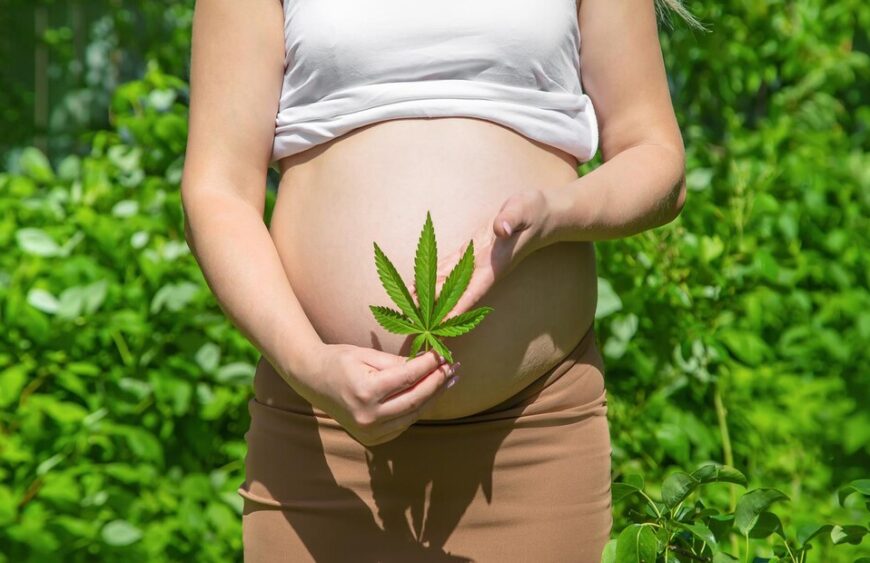Exploring the Effects of Cannabis on Pregnancy and Postpartum Health
February 22, 2024 2024-03-21 23:06Exploring the Effects of Cannabis on Pregnancy and Postpartum Health

Exploring the Effects of Cannabis on Pregnancy and Postpartum Health
Primary studies have shown that cannabis use during pregnancy and postpartum can have potential risks, including low birth weight, preterm birth, and developmental issues in the baby. Individuals need to be aware of these risks and make informed decisions about cannabis use during this critical period.
Understanding the perceptions of risks and the decisions individuals make about cannabis use during pregnancy and postpartum can help us provide better support and education for those navigating this complex issue. By staying informed, we can work towards promoting the health and well-being of both mothers and their babies.
Understanding Cannabis Use in Pregnancy
Pregnancy is a time of heightened caution and consideration for the health of the mother and the developing fetus. However, the use of cannabis during pregnancy, also known as prenatal cannabis exposure, is a topic of growing concern.
The prevalence of cannabis use among pregnant women is crucial for addressing this issue and promoting the well-being of mothers and child. It is important to examine the potential risks associated with cannabis use during pregnancy, to inform healthcare providers and policymakers on how to best support pregnant women in making informed and healthy choices for themselves and their unborn babies.
What are the adverse pregnancy outcomes of cannabis exposure in early pregnancy?
Exposure to cannabis during early pregnancy has been associated with adverse pregnancy outcomes. Prenatal cannabis can lead to negative outcomes for the mother and the baby. The potential negative health effects of cannabis use during pregnancy also include anemia and unfavorable birth outcomes.
Studies have shown that women who use cannabis during pregnancy are more likely to deliver babies with low birth weight, which can increase the risk of health problems for the baby both at birth and later in life. Preterm births can also lead to a range of health issues for the baby, are also more common among women who use cannabis during pregnancy.
Risk and Potential Effects of Cannabis Use During Pregnancy and Postpartum
Despite the legalization of cannabis in British Columbia, there is still a lack of proven safety when it comes to its use during pregnancy and breastfeeding. Health care providers strongly advise against using any form of cannabis during this critical period.
The potential effects of cannabis use during pregnancy and postpartum include adverse neonatal outcomes, such as low birth weight, preterm birth, and impaired neurodevelopment. Also, the use of cannabis can have long-term effects on the child’s cognitive and behavioral development.
Cannabis use during the postpartum period can also impact breastfeeding, as THC, the active component in cannabis, can be present in breast milk. This can potentially affect the infant’s development and should be a cause for concern for mothers who are breastfeeding.
What are the birth outcomes associated with cannabis after pregnancy?
Maternal marijuana use during pregnancy has been associated with negative birth outcomes, including low birth weight. Studies have shown that infants born to mothers who used marijuana during pregnancy were more likely to have low birth weight compared to infants born to non-using mothers.
Other potential negative health effects associated with maternal marijuana use may include preterm birth, stillbirth, and neonatal intensive care admission. This outcome of pregnancy can have long-term implications for the involvement of child’s health and development.
Concerns and Considerations of Cannabis Use During Pregnancy

It is important to consider the potential consequences of using cannabis during pregnancy, particularly the stage of reproduction. Effective treatments and interventions for addressing cannabis use during pregnancy are available but require a thorough understanding of the individual’s needs and circumstances. Furthermore, aggressive behavior and other negative effects of cannabis use can impact the mother and the child during pregnancy. Understanding the potential harms and risk factors associated with cannabis use during pregnancy is crucial for making informed decisions about maternal and fetal health.
Is it safe to take cannabis gummies while pregnant?
Taking cannabis gummies while pregnant can pose significant risks to the mother and the developing fetus. Research has shown that the use of cannabis during pregnancy is associated with an increase in hospital visits related to cannabis use, as well as an increased risk of premature births and low birth weights. The negative health effects of cannabis use, such as impaired cognitive function, respiratory issues, and potential addiction, remain the same whether in or outside of pregnancy.
Factors associated with cannabis use during pregnancy include demographic characteristics, the biological father’s cannabis use, and a history of cannabis addiction. These factors can contribute to the likelihood of a pregnant woman using cannabis gummies or other forms of cannabis during her pregnancy.
Pregnant individuals need to avoid using cannabis, including edibles, due to the potential risks to the pregnancy and the developing baby. Instead, seeking proper prenatal care, addressing any substance abuse issues, and managing symptoms of pregnancy and chronic pain through safe and approved methods are crucial for the health and the well-being of the mother and the baby.
Why is smoking harmful during pregnancy?
Smoking during pregnancy has detrimental effects on both maternal and infant outcomes. Maternal smoking has been linked to an increased risk of preterm birth, where the baby is born before 37 weeks of gestation, as well as a higher likelihood of the infant being born with a low birth weight. These outcomes can lead to various health complications for the baby, including respiratory issues, feeding difficulties, and long-term developmental delays.
The harmful effects of smoking extends to the potential risks of cannabis use during pregnancy. Exposure to drugs, including cannabis, during the 1st trimester of pregnancy can interfere with the baby’s brain development and increase the prevalence of cesarean section and gestational diabetes.
Cannabis Use During Breastfeeding
Cannabis use during breastfeeding poses potential risks to the infant’s health and development. THC, the primary psychoactive component of cannabis, can be transferred into human milk, exposing the baby to its effects. Studies have shown that THC can accumulate in human breast milk, leading to potential adverse effects on the infant’s neurobehavioral development and motor skills.
Health professionals should be aware of the potential risks of cannabis use during breastfeeding and educate postpartum people about the potential impact on infant development. Furthermore, support for individuals with cannabis dependence and mental health concerns should be readily available to ensure the well-being of the mother and the infant.
Postpartum Cannabis Use And Its Potential Impact on Maternal Health
Postpartum cannabis use can have potential impacts on maternal health, especially considering the lack of proven safe levels of marijuana use during pregnancy and breastfeeding. Maternal cannabis use during the postpartum period can lead to adverse pregnancy outcomes, including preterm birth, low birth weight, and neurobehavioral problems in the child. The risks and potential consequences of cannabis use in the postpartum period also include impaired maternal caregiving abilities, increased risk of depression and anxiety, and compromised infant development.
THC, the active ingredient in marijuana, can be transmitted through breast milk, potentially affecting the infant’s neurodevelopment. Postpartum women should be educated about these risks and supported in seeking treatment for cannabis use disorders to protect both maternal and infant health during this period.
Recommendations for Cannabis Use During Pregnancy and Postpartum
Medical cannabis use during pregnancy and postpartum is a highly debated topic, with concerns about potential harm to the mother and the developing fetus. However, research has shown that there are potential benefits of cannabis for nausea, pain, and other pregnancy-related symptoms.
Healthcare providers must understand the effects of recreational cannabis and exposure to cannabis during pregnancy, as well as the potential adverse effects on maternal and fetal health.
Alternative Methods for Managing Pregnancy-Related Symptoms
Pregnant individuals experiencing symptoms such as nausea and vomiting may seek alternative methods for relief, considering the potential harm of cannabis use to the developing fetus and the risk of cannabinoid hyperemesis syndrome. Lifestyle adjustments, such as staying hydrated and eating small, frequent meals, can also help alleviate pregnancy-related symptoms. Individuals need to consider their reasons for seeking relief and consult their healthcare provider for personalized recommendations.
When considering cannabis use for symptom management, it is important to consider the mode of ingestion and the rate of cannabis use. Prenatal exposure to cannabis may have adverse effects of marijuana on the developing fetus, and the relationship between cannabis use and cannabinoid hyperemesis syndrome is a concern.
Conclusion: Balancing Personal Choices With The Potential Risks of Cannabis Use During Pregnancy and Postpartum
Even with the legalization of cannabis, caution is warranted. The consequences of cannabis use during pregnancy can be long-lasting and impactful. There is also a risk of sudden infant death syndrome from exposure to cannabis after birth. Second-hand cannabis exposure can also pose risks to the infant.
Pregnant people need to balance individual reasons with the potential risks of marijuana use. While some may argue for the use of recreational cannabis for symptom management, it is important to consider the well-being of the fetus and infant. Women who use cannabis before pregnancy should be aware of the maternal risks and consider seeking support to stop or reduce use during pregnancy and postpartum.
